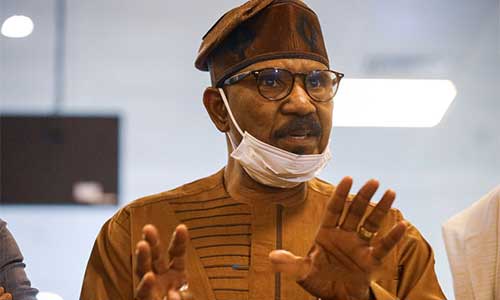Health
Nigeria ready for health emergency – Mamora

The Federal Government has restated its commitment to invest in health security to enhance the country’s preparedness against future pandemics.
Dr Olorunnimbe Mamora, Minister of State for Health, gave the assurance on Thursday during a webinar organised by The Conversation Africa.
The webinar was themed: ‘Nigeria and the next pandemic: Preparedness, Response, and Vaccine.’
Mamora said that the government had started to implement steps through the Basic Health Care Provision Fund where the Nigeria Centre for Disease Control would be provided with 2.5 per cent of the fund for health emergencies.
He noted that COVID-19 had devastating effects on many countries as it affected lives, economy, travels and social interactions; necessitating a redirection of health resources to fight the pandemic.
“The world would be a better place if we invest in pandemic preparedness, thereby utilising these disruptions to build more sustainable and resilient health systems in Nigeria,” he said.
The minister noted that the World Health Organisation (WHO) had estimated that the world would face a pandemic threat every five years.
He said that the country must be better prepared against future pandemics.
Mamora, however, pointed out that the world had been faced with a huge challenge of inequitable vaccine distribution, with Africa bearing the brunt of it.
He noted that while countries in Europe had vaccinated about 50 per cent of their population, Africa had only done about one per and currently faced with a vaccine shortage.
“The pandemic has created a sense of urgency around vaccine development and manufacturing in the African region.
“In Nigeria, we are taking advantage of this opportunity to fully establish our capacity for vaccine manufacturing.
‘We’ve been working closely with Bio Vaccines Limited, a joint venture between the Federal Government and May and Baker Nig. Ltd.
“We are strongly aligned with the Africa Centre for Disease Control and Prevention (Africa-CDC) target that by 2040, Africa should move from manufacturing one per cent of its vaccines to 60 per cent,” he said.
According to the minister, Nigeria has the market size and commitment required to actualise the target.
Also, Dr Doyin Odubanjo, Secretary of the Nigerian Academy of Science, said that to achieve local vaccine production, policymakers should collaborate more with researchers.
He advised that the issues of distrust should be removed toward building interdependence that would advance the country’s health sector and development.
Similarly, Prof. Folasade Ogunsola, Professor of Medical Microbiology, said the gaps in the health and education systems needed to be bridged to enhance the country’s preparedness against the next pandemic.
Ogunsola called for long-term and sustainable funding of research projects and innovations to position the country strategically to fight pandemics.
Prof. Oyewale Tomori, a virologist, however, noted that the country might not be fully prepared to fight the next pandemic if it forgot lessons learnt during the COVID-19 quickly.
Tomori said the challenges of the COVID-19 pandemic had made it difficult for the country to find lasting solutions to Lassa fever, cholera, meningitis, among other epidemics in the country.




 Davido's Net Worth & Lifestyle
Davido's Net Worth & Lifestyle 
